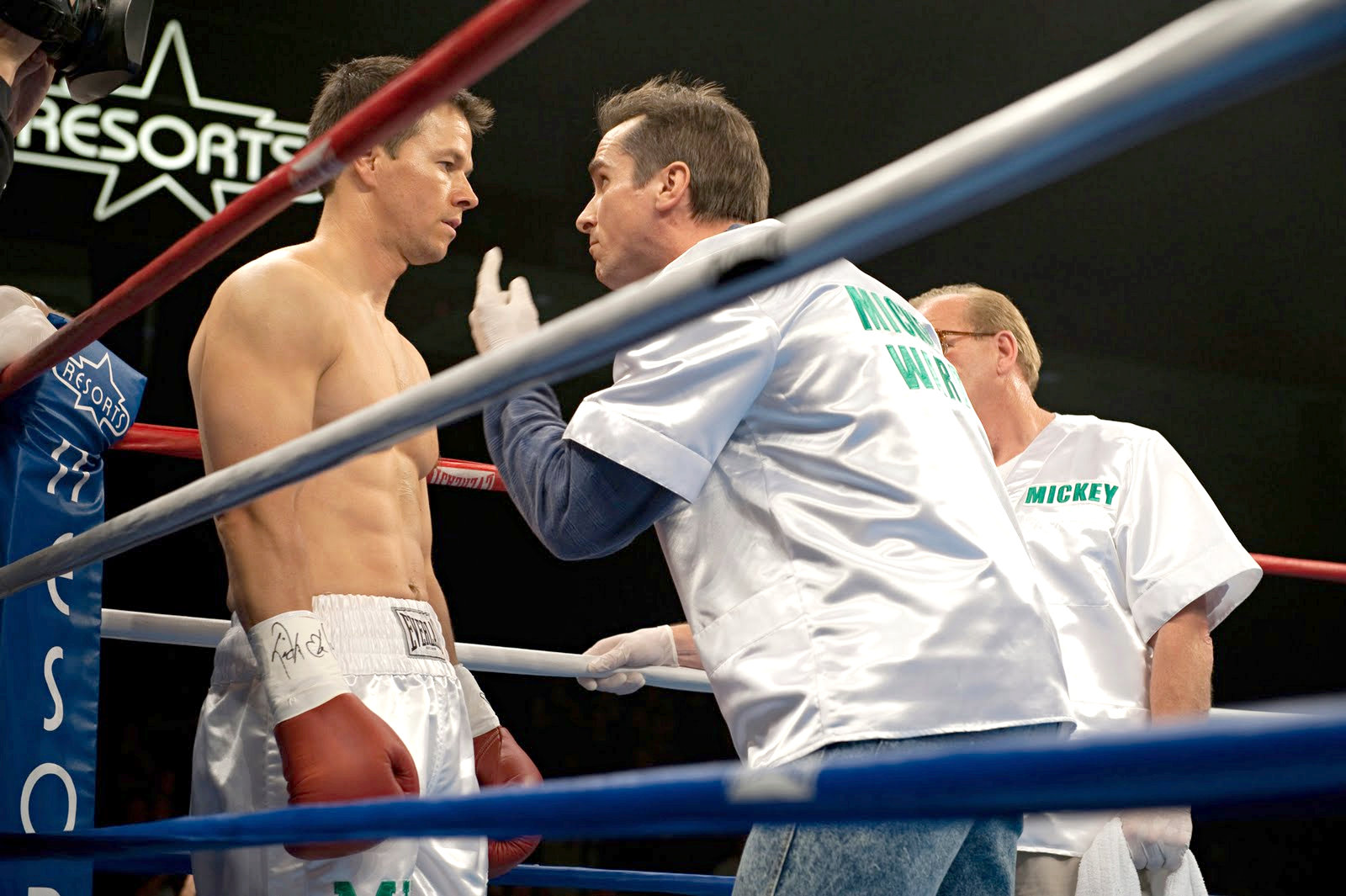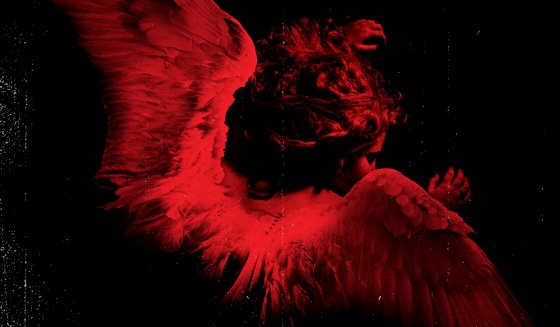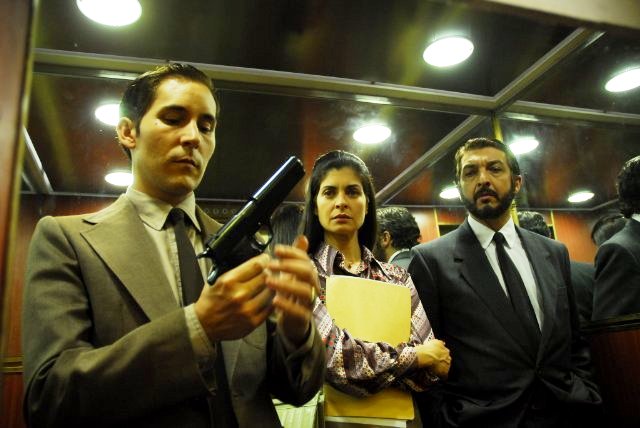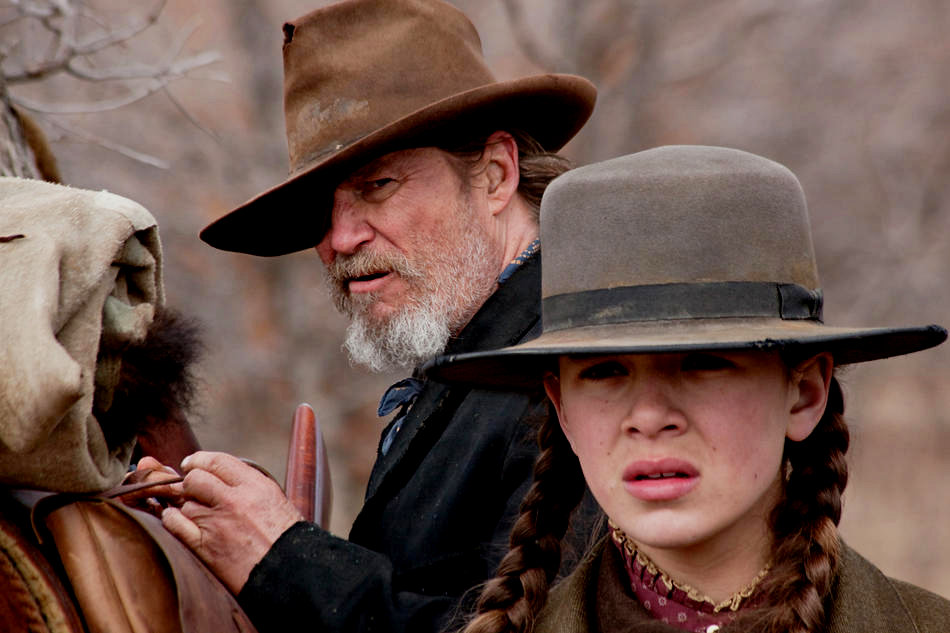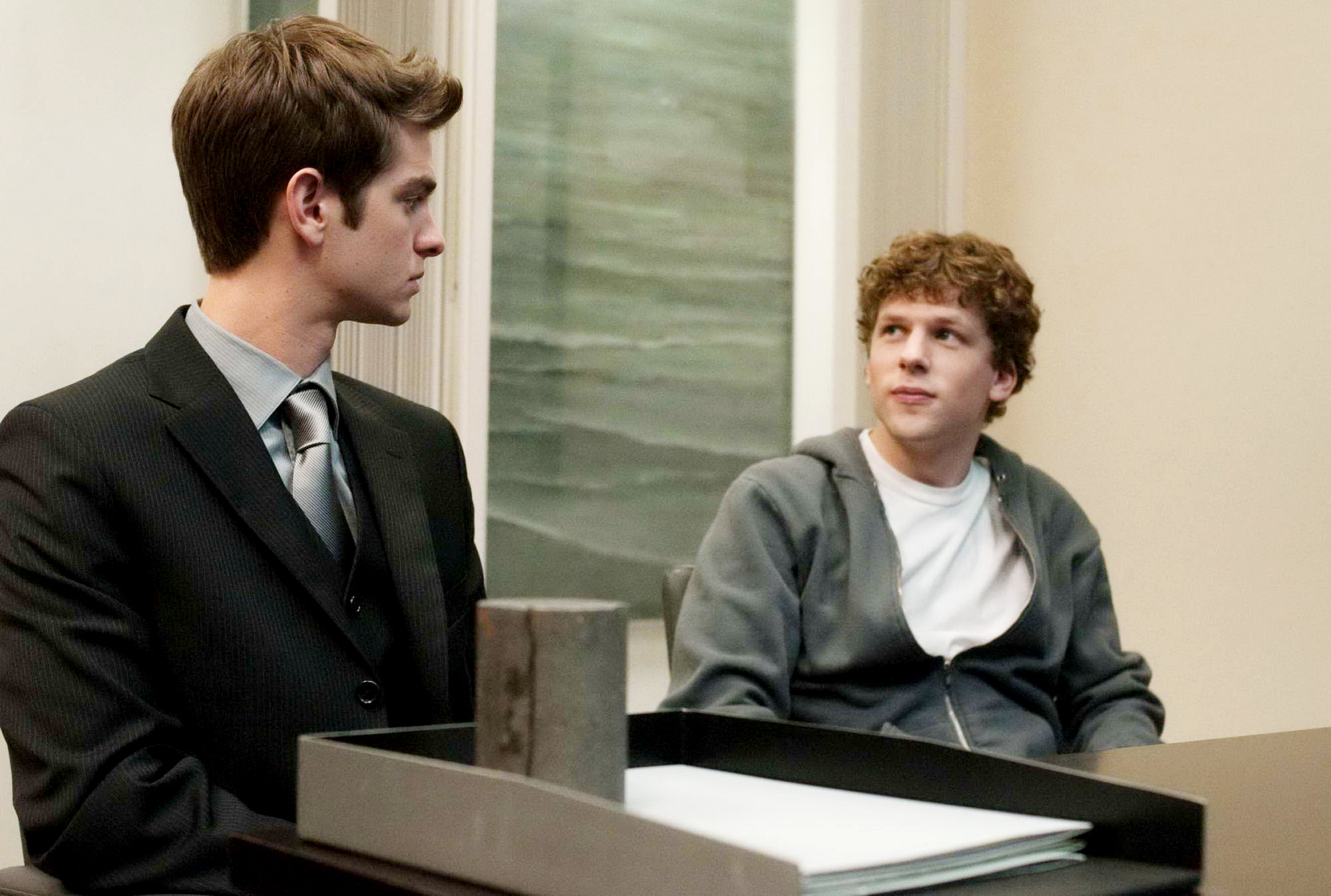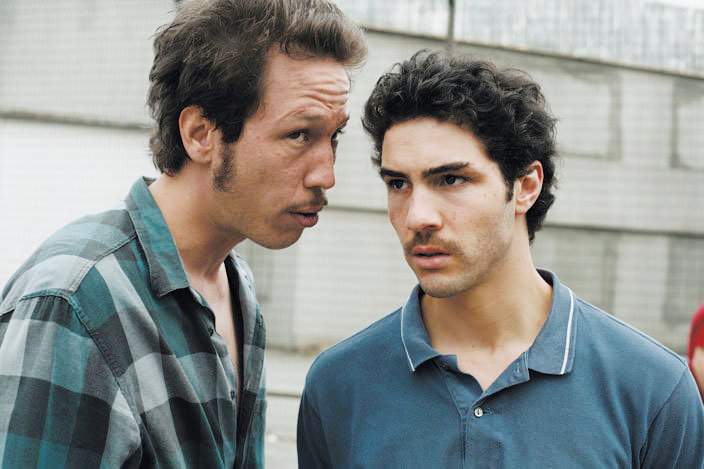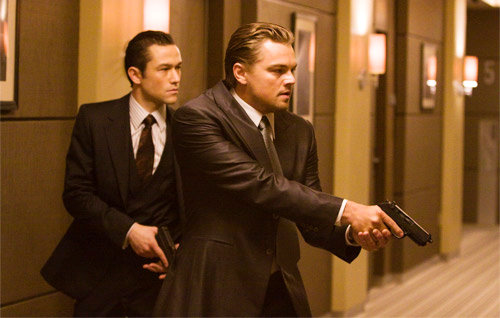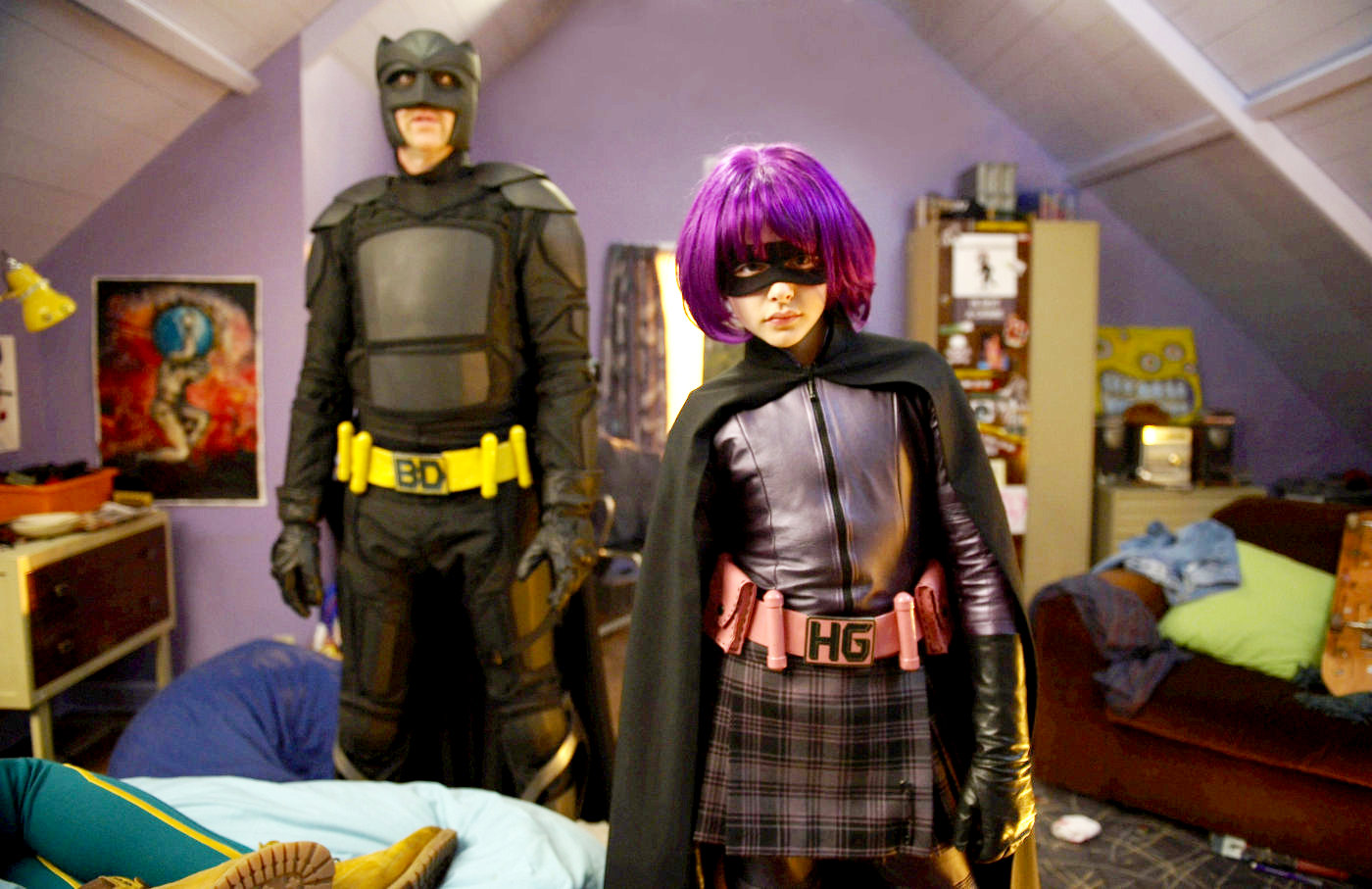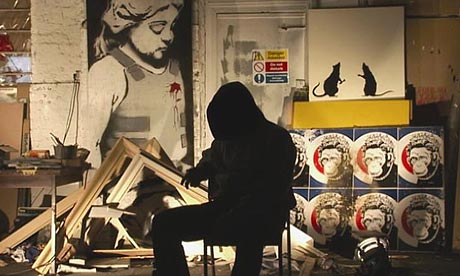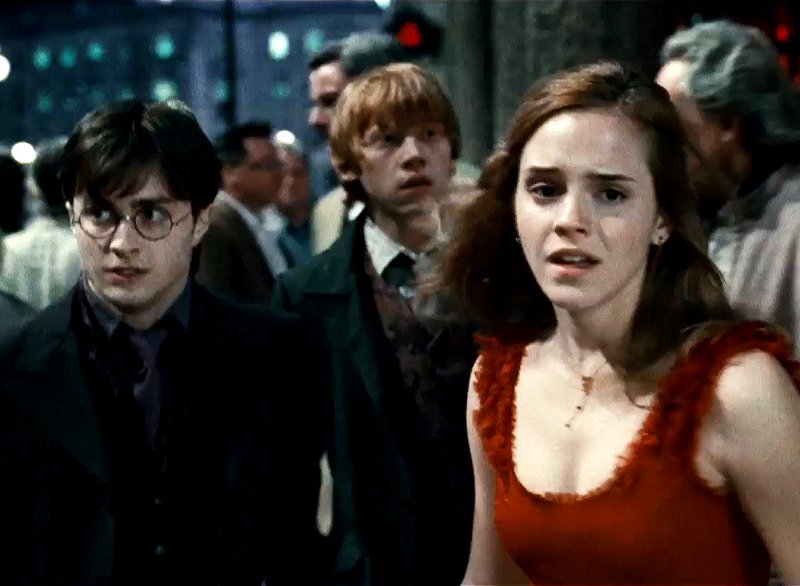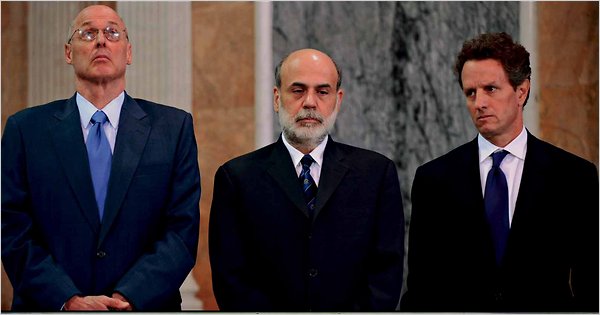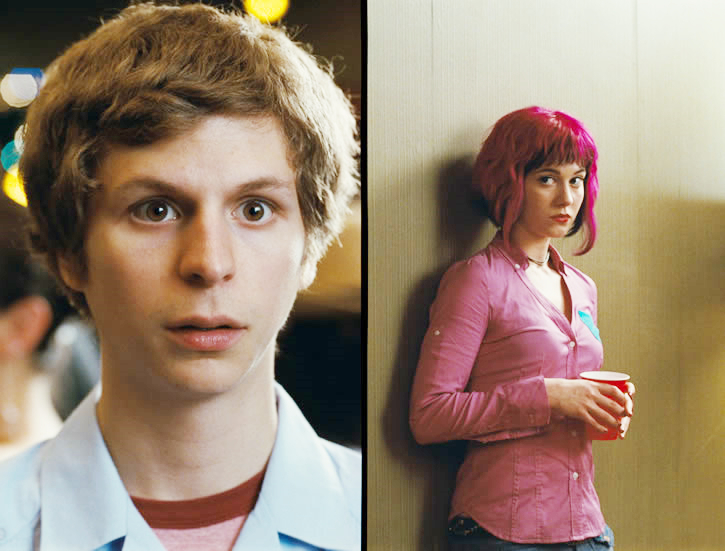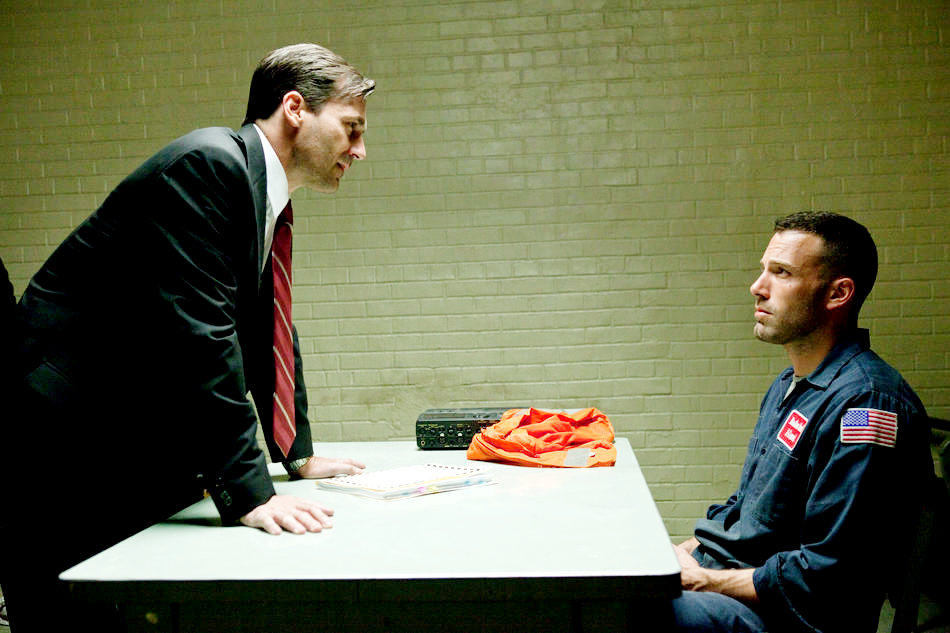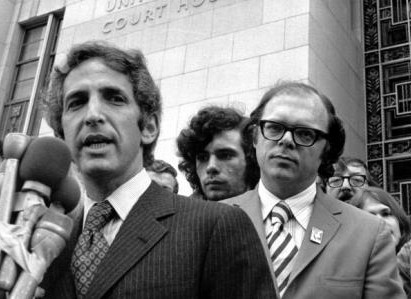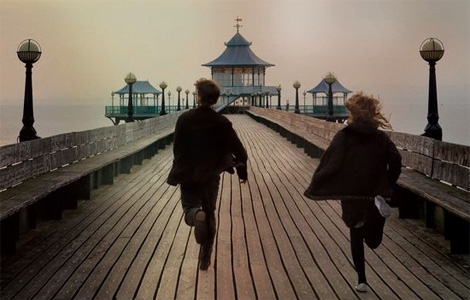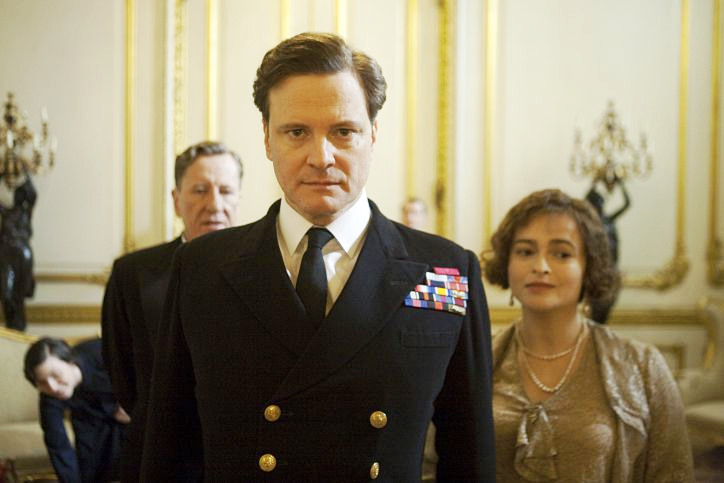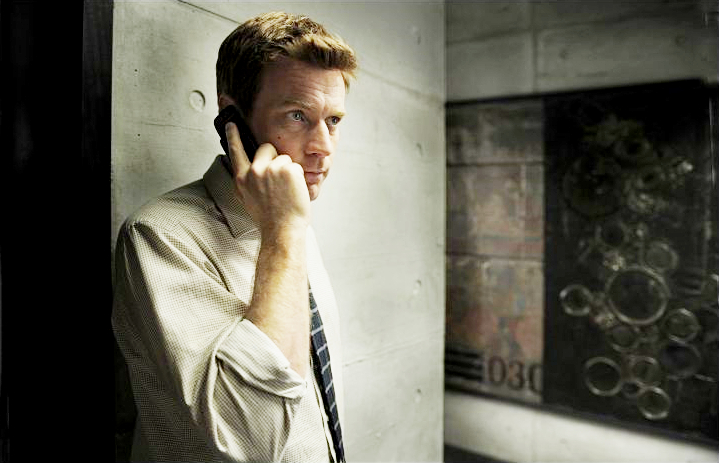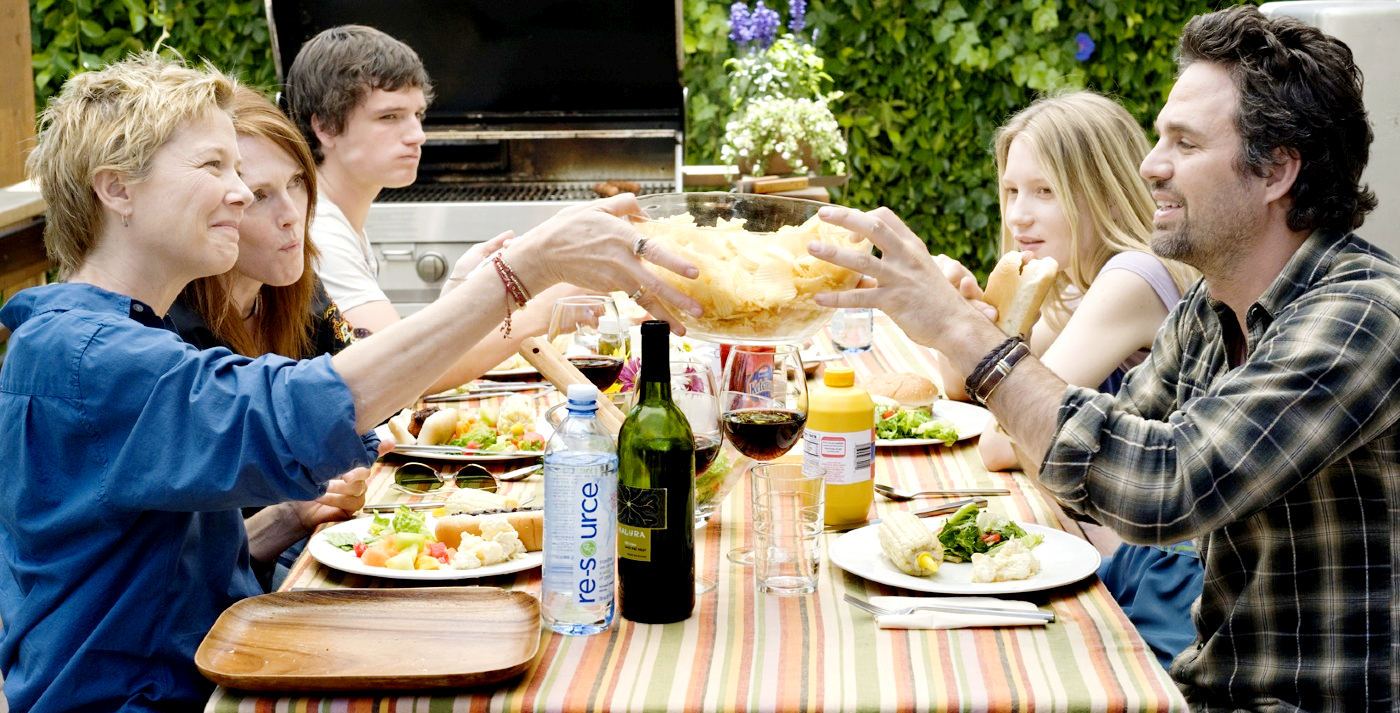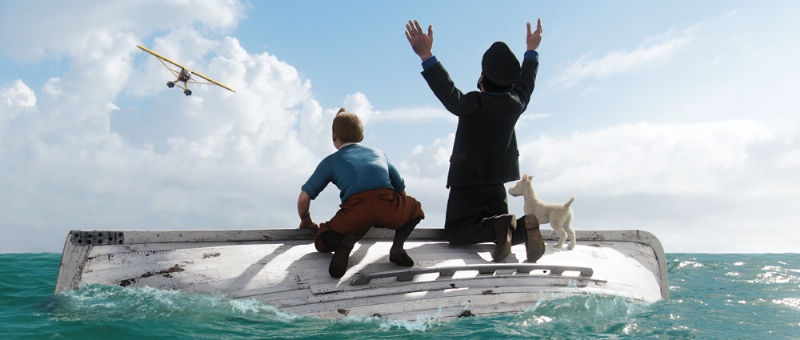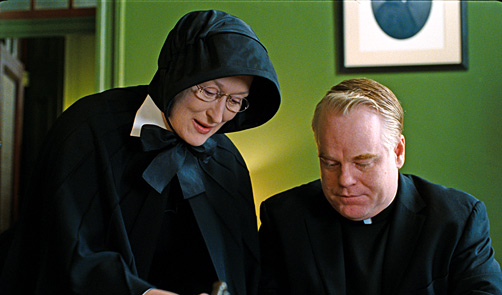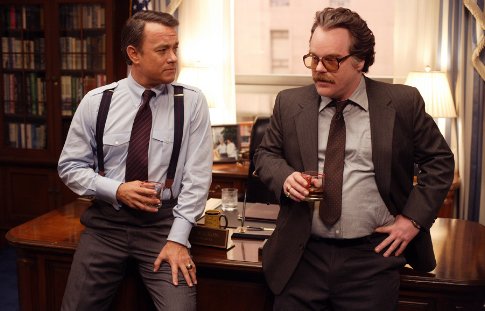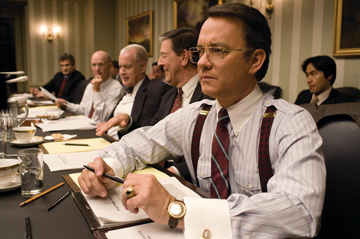Happy New Year, everyone. So unlike last year, when I took an extra month on account of my travels in New Zealand, the Best of 2007 Movie list seems ready to go out on schedule, and it’s below. (If you’ve been reading all the reviews around here, I’m betting the top few choices won’t be a surprise. Still, organizing the 5-15 section was more tough than usual this year.) At any rate, 2008 should be a big orbit around the sun in any event, what with grad school winding down and it being time — at last! — to pick a new president. So a very happy new year to you and yours, and let’s hope the movies of the coming year will contain to sustain, amuse, baffle, and delight.
Top 20 Films of 2007
[2000/2001/2002/2003/2004/2005/2006]
1.
I’m Not There: “
There was a movie I seen one time, I think I sat through it twice.” Admittedly, it was a wonderful confluence of my interests. Nevertheless, Todd Haynes’ postmodern celebration of Bob Dylan, brimming over with wit and vitality and as stirring, resonant, and universal as a
well-picked G-C-D-Em progression, was far and away my favorite film experience of the year. It seems to have slipped in a lot of critics’ end-of-year lists (although
Salon‘s Stephanie Zacharek also put it up top, and the
Sun-Times‘ Jim Emerson has been championing it too), but so be it — You shouldn’t let other people get their kicks for you anyway. A heartfelt, multi-layered, six-sided puzzle about the many faces and voices of Dylan, l found
I’m Not There both pleasingly cerebral and emotionally direct, and it’s a film I look forward to returning to in the years to come. Everybody knows he’s not a folk-singer.

2.
No Country for Old Men: It probably won’t do wonders for West Texas tourism. Still, the Coens’ expertly-crafted
No Country works as both a visceral exercise in dread and a sobering philosophical rumination on mortality and the nature of evil. (And in his chilling portrayal of Anton Chigurh, Javier Bardem has crafted a movie villain for the ages.) People
sometimes refer to Coen movies as “well-made” as a dig, as if the brothers were just soulless clinically-minded technicians. I couldn’t disagree with that assessment more. Still,
No Country for Old Men seems so seamless and fully formed, so judicious and economical in its storytelling, that it reminds me of Salieri’s line in
Amadeus: “
Displace one note and there would be diminishment, displace one phrase and the structure would fall.” A dark journey that throbs with a jagged pulse,
No Country for Old Men is very close to the best film of the year, and — along with
Miller’s Crossing,
Fargo, and
The Big Lebowski — yet another masterpiece sprung from the Coens’ elegant and twisted hive-mind. Bring on
Burn After Reading.

3.
The Diving Bell and the Butterfly: Through the wonders of cinematic alchemy, Julian Schnabel took the sad real-life account of
Vogue editor Jean-Do Bauby’s horrific imprisonment within his own body and made it soar. No other film this year put the “locked-in” experience of taking in a movie as inventively in service of its story (although I kinda wish
Atonement had tried.) Special kudos to Mathieu Almaric for conveying so much with so little to work with, and to Max von Sydow for his haunting turn as Bauby’s invalid father. And, lest someone holds “arthouse foreign film” against it,
Diving Bell is both much funnier and more uplifting than anyone might expect of a tale about hospital paralysis. Salut.
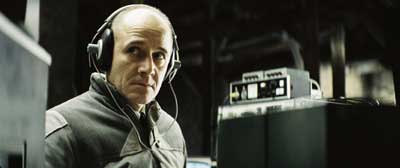
[3.]
The Lives of Others: The one hold-over from 2006 on the list this year (I was pretty thorough about catching up
before posting last January, although I still never did see
Inland Empire),
The Lives of Others is a timely and compelling parable of art, politics, surveillance, and moral awakening in the final days of the Stasi. In a way,
Lives is an East German counterpart to
Charlie Wilson’s War, a story about how even small political acts of individual conscience can change the world, even (or perhaps especially) in a decaying Orwellian state. With a memorable central performance by Ulrich Muhe and a languid conclusion that ends on exactly the right note, the resoundingly humanist
Lives of Others is a Sonata for a Good Man in Bad Times. We could use more of its ilk.

4.
Knocked Up: Judd Apatow’s sweet, good-natured take on modern love and unwanted pregnancy was probably the most purely satisfying film of the summer. As funny in its pop-culture jawing as it was well-observed in its understanding of relationship politics,
Knocked Up also felt — unlike the well-meaning but overstylized
Juno, the film it’ll most likely be paired with from now herein — refreshingly real. As I said in my recent review of
Walk Hard, an eventual
Apatow backlash seems almost inevitable given how many comedies he has on the 2008 slate. Nevertheless, we’ll always have
Freaks & Geeks, and we’ll always have
Knocked Up.

5.
The Bourne Ultimatum: The third installment of the
Bourne franchise was the best blockbuster of the year, and proved that director Paul Greengrass can churn out excellent, heart-pounding fare even when he’s basically repeating himself. Really, given how much of
Ultimatum plays exactly like its two predecessors on the page — the car chase, the Company Men, the Eurotrash assassin, Julia Stiles, exotic locales and cellphone hijinx — it’s hard to fathom how good it turned out to be. But
Bourne was riveting through and through…You just couldn’t take your eyes off it. I know I’ve said this several times now, but if Zack Snyder screws up
Watchmen (and I’d say the odds are 50-50 at this point),
the lost opportunity for a Greengrass version will rankle for years.

6.
Zodiac: The best film of the spring. What at first looked to be another stylish David Fincher serial killer flick is instead a moody and haunting police procedural about the search for a seemingly unknowable truth, and the toll it exacts on the men — cops, journalists, citizens — who undertake it for years and even decades. Reveling in the daily investigatory minutiae that also comprise much of
The Wire and
Law and Order, and arguably boasting the best ensemble cast of the year,
Zodiac is a troubling and open-ended inquiry that, until perhaps the final few moments, offers little in the way of satisfying closure for its characters or its audience. Whatever
Dirty Harry may suggest to the contrary, the
Zodiac remains elusive.

7.
28 Weeks Later: Sir, we appear to have lost control of the Green Zone…Shall I send in the air support? Zombie flicks have been a choice staple for political allegory since the early days of Romero, but one of the strengths of Juan Carlos Fresnadillo’s merciless
28 Weeks Later — perhaps the best horror sequel since
James Cameron’s Aliens — is that it foregoes the 1:1 sermonizing about failed reconstructions and American hubris whenever it gets in the way of the nightmare scenario at hand. (Besides, if you wanted to see explicit muckraking about current events this year, there were options aplenty, from
In the Valley of Elah to
No End in Sight, although plenty of this year’s politically-minded forays —
Rendition,
Lions for Lambs — looked rather inert from a distance.) There’s little time for moralizing in the dark, wretched heart of
28 Weeks Later: In fact, the right thing to do is often suicide, or worse. You pretty much have only one viable option: run like hell.

8.
In the Valley of Elah: Paul Haggis’ surprisingly unsentimentalized depiction of the hidden costs of war for the homefront,
Elah benefits greatly from Tommy Lee Jones’ slow burn as a military father who’s lost his last son to a horrific murder. In fact, it’s hard not to think of Jones’ inspired performances here and in
No Country of a piece. There was something quintessentially America-in-2007 about Jones this year. In every crease and furrow of this grizzled Texan’s visage, we can see the wounds and weariness of recent times, the mask of dignity and good humor beginning to slip in the face of tragic events and colossal stupidity. Jones is masterful in
Elah, and while Daniel Day-Lewis seems to be garnering most of the accolades for
There Will Be Blood and Philip Seymour Hoffman stunned in three pics this fall (all on the list below), I’d put Jones’ work here as the best of the year.

9.
There Will Be Blood: Ah, the maddening
There Will Be Blood. I just reviewed this one yesterday, so it’s doubtful my opinion on it has changed much. But what Anderson’s film reminds me of most at the moment (and not only for the Daniel Day-Lewis connection) is
Scorsese’s Gangs of New York, a movie I reviewed at the end of 2002 and then bumped up a few spots a week later when writing
the 2002 list, thinking that its flaws would diminish over time. They haven’t — if anything, they’re just as noticeable as ever. So it may well be with
TWBB. Even despite its somewhat unseemly pretensions to greatness, the first hour or so of
There Will Be Blood, from the Kubrickian opening to the
Days in Heaven-ish burning oil rig, is as powerful and memorable as you could ever want in a film. But
TWBB loses its way, and the second half is a significantly less interesting enterprise, ultimately culminating in that goofy, illogical bowling alley ending. I’d characterize
Blood as a significant step forward for PTA, and there’s something to be said for getting even this close to a masterpiece. But he hasn’t struck black gold yet.

10.
Hot Fuzz: While I personally still prefer
Shaun of the Dead, this fish-out-of-water, buddy-cop action spectacle proved the droll British team of Nick Frost, Simon Pegg, and Edgar Wright can’t be considered one-hit-wonders (and that they’re as savvy about certain pop culture tropes as their American colleagues in the Apatow camp.) And, while I didn’t see
Elizabeth II: The Golden Age,
Hot Fuzz may well include the second-best Cate Blanchett performance of the year.
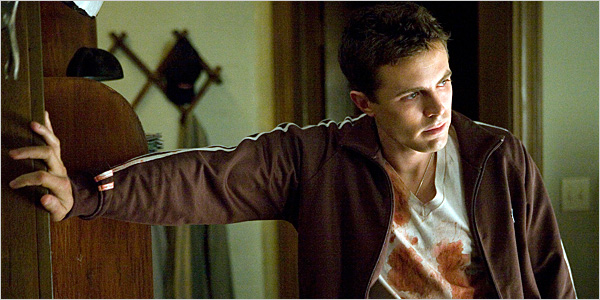
11.
Gone Baby Gone: First-time director Ben Affleck acquits himself well with this chronicle of missing children and seedy n’er-do-wells in working-class Boston, wisely choosing to stick with a town and a leading man he knows like the back of his hand. His brother Casey holds his own, and crime author Dennis Lehane’s original source material provides some compelling twists-and-turns throughout. And, as the drug-addled, quick-to-dis Townie mom who’s lost her baby,
The Wire‘s Amy Ryan gives arguably the Best Supporting Actress performance of the year (although she’ll likely get some run from Blanchett’s Jude Quinn.)

12.
Michael Clayton: Clooney’s impeccable taste in projects continues with this, Tony Gilroy’s meditation on corporate malfeasance and lawyerly ethics (or lack thereof.) The bit with the horses still seems a convenient (and corny) happenstance on which to hang such a major plot point, and I found Tilda Swinton to be overly mannered and distracting for much of the film’s run. But most else about
Michael Clayton, from Sidney Pollack’s Master of the Universe to Michael O’Keefe’s snide, unctuous #2 to Tom Wilkinson’s last scene to Clooney not rebounding as well to events as, say, Danny Ocean, rang true. A small film, in its way, but a worthwhile one.
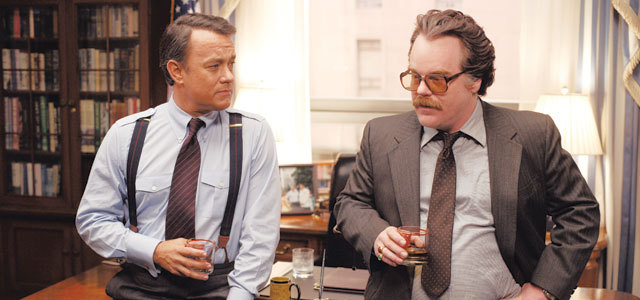
13.
Charlie Wilson’s War: Another one I wrote on in the past 24 hours, so I don’t have much to add. Perhaps the best thing about Mike Nichols and Aaron Sorkin’s adaptation of Crile’s book is that it “gets” politics like few recent Washington thrillers I can think of. Philip Seymour Hoffman shows impeccable comic timing as the gruff Gust Avrakotos, and he works very well with Hanks here, who’s gone from being overexposed a few years ago back to a guy I wouldn’t mind seeing more of, particularly if he continues along the Alec Baldwinish character actor path
Wilson sometimes suggests could be his future.
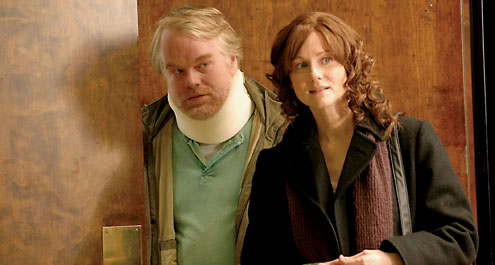
14.
The Savages: I actually thought about putting Tamara Jenkins’
The Savages higher on this list, and few other movie endings this year hit me in the gut quite like this one. But, there are definite problems here, such as the wheezy Gbenga Akinnagbe subplot, which compel me to keep it here in the mid-teens. Still, this comedy about an ornery lion in winter, and the battling cubs who have to come to his aid, is a worthwhile one, and particularly if you’re in the mood for some rather black humor. As Lenny the senescent and slipping
paterfamilias, Philip Bosco gives a standout performance, as does Hoffman as the miserable Bertholdt Brecht scholar trapped in deepest, darkest Buffalo.
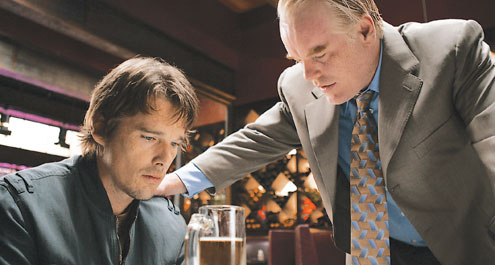
15.
Before the Devil Knows You’re Dead: Now,
Before the Devil is a movie I did end up seeing twice, on account of Brooklyn friends who were looking to catch it, and the film didn’t bring much new to the table on that second viewing. Still, Sidney Lumet and Kelly Masterson’s lean family tragedy benefits from several excellent performances — most notably by Hoffman, Ethan Hawke, Marisa Tomei, and Albert Finney, but also in supporting work by Amy Ryan, Michael Shannon, Brian O’Byrne, and Rosemary Harris — as well as a memorable Carter Burwell score. (Also, it’s just a coincidence that the three Hoffman movies ended up in a row like this — Still, it’s a testament to the man’s ability that he seemed unique and fully formed in each. Then again, the only time I can think of that Hoffman was actually
bad in a film was
Cold Mountain, which was pretty glitched up regardless.)

16.
Sunshine: Along with
There Will Be Blood, Danny Boyle and Alex Garland’s exasperating
Sunshine is the other film this year that saw an amazing first hour become undone by breathtakingly poor choices on the back end. Unlike the halting, confused slide of
TWBB, though, the moment where
Sunshine slips the rails is clear-cut and irrefutable: It’s when what had been a heady science fiction tale about a near-impossible mission to the heart of the sun became instead an unwieldy space-slasher flick, i.e. basically an
Armageddon variation on
Jason X. The wreckage this subplot makes of what had been a superior
hard-sci-fi film is more than a little depressing…Still, for that first hour,
Sunshine is really something, perhaps the best realistically-portrayed outer space voyage we’ve seen on-screen in years.
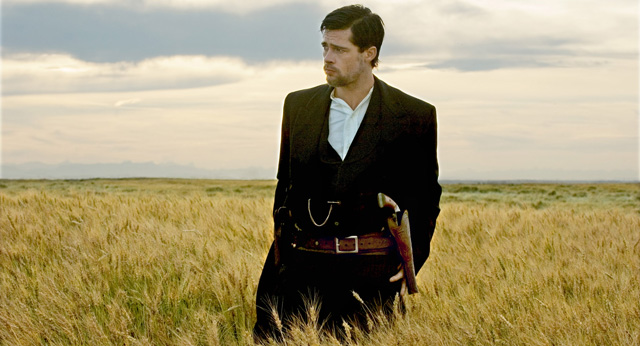
17.
The Assassination of Jesse James by the Coward Robert Ford: Andrew Dominik’s sprawling psychological western about the end of the West and the early days of American celebrity-worship is every bit as ambitious and flawed as PTA’s
There Will Be Blood. Still, maybe it’s the often stunning Roger Deakins cinematography, or the lively character actors (Sam Rockwell, Jeremy Renner, Garret Dillahunt) in the margins of the film, or maybe it’s even the terrible omniscient voiceover, which is every bit as distracting as the similarly ham-handed one in
Little Children, and so goofy at times it verges on endearing. Whatever it is, I warmed to
Jesse James more than I probably should, and for whatever reason I feel more willing to forgive it its considerable problems. If you blinked, you probably missed its theatrical run…but maybe it’ll find new life on DVD, when the 160-min running time won’t seem so off-putting.
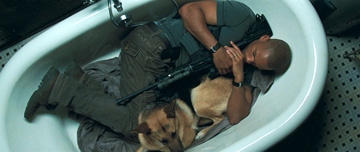
18.
I am Legend: When the film focused on Will Smith and his dog fighting blood-sucking and badly rendered CGI Infecteds (whose level of social deevolution changed back and forth solely to accommodate turns in the plot), Francis Lawrence’s
I am Legend could seem pedestrian and forgettable. But, when the movie focused on Will Smith and his dog fighting interminable loneliness in an eerily abandoned New York City, which was most of the first two-thirds of the film,
I am Legend was a surprisingly melancholy and resonant blockbuster. What can I say? This one hit me where, and how, I live.
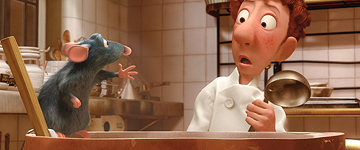
19.
Ratatouille: There’s no review of this one up — I actually only saw it on DVD last week. And yet, while
Ratatouille is a visual marvel (and Brad Bird and the PIXAR gurus don’t seem to make bad films), I found this nowhere near as inventive or entertaining as their last collaboration,
2004’s The Incredibles. (I’d put this one at about the level of
Cars.) Now, this may in part be due to the fact that I have much more interest in comic book conceits than the culinary arts. (I’d even go so far as to say that I find many foodies — particularly those who blather on endlessly about Parisian cuisine — kind of insufferable.) Still, even given my relative lack of interest in the subject matter,
Ratatouille bugged me. If “anyone can cook,” as Chef Gustave proclaims, why is no one’s input ever important but the rat? If it’s bad to make money selling pre-cooked (and affordable) food to the teeming masses, as Ian Holm’s character tries to do, why is it any better to do what Remy does? (And why should we care then when he and Gustave Jr. move into a deluxe apartment in the sky? I thought this enterprise wasn’t about making money.) In short, I thought
Ratatouille wanted to have it both ways, cloaking a rather elitist, even snobbish story in the trappings of democratic tolerance. And the closing monologue by Peter O’Toole’s Anton Ego, which I thought ostensibly tried to make the movie critic-proof, irked me too. But, all that aside, it does look real purty.
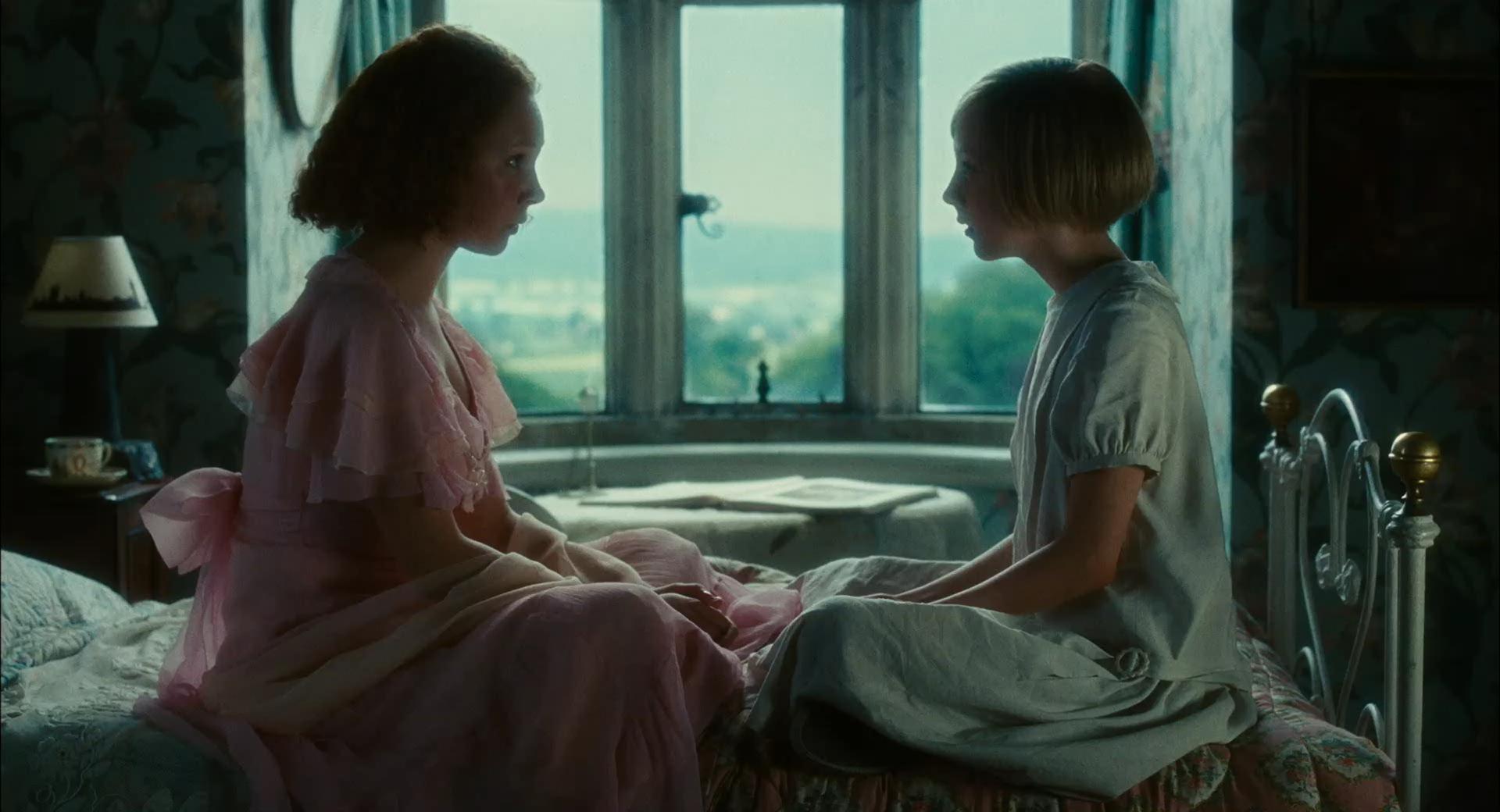
20.
Atonement: There were several contenders for this last spot on this list, including
Harry Potter and the Order of the Phoenix,
The Simpsons Movie, and
Jason Reitman’s Juno. But in the end I went with Joe Wright’s take on Ian McEwan’s novel, partly because people I trust who haven’t read the book beforehand haven’t shared my issues with the film. If nothing else,
Atonement looks ravishing, and it features breakout performances by James McAvoy, Romola Garai, and Saiorse Ronan. Still, in a year that saw
No Country and
Diving Bell, I wish Wright had been less conventional in its approach to the story, and found a way to do the gloomy, misanthropic ending of McEwan’s novel justice.
Most Disappointing: The Golden Compass, Grindhouse, Spiderman 3, Southland Tales
Worth a Rental: 3:10 to Yuma, Beowulf, Eastern Promises, Harry Potter and the Order of the Phoenix, Juno, Live Free or Die Hard, Lust, Caution, Ocean’s 13, The Simpsons Movie, Stardust, Superbad, Walk Hard: The Dewey Cox Story
Don’t Bother: 300, Across the Universe, American Gangster, The Darjeeling Limited, Interview, The Invasion, Margot at the Wedding, The Mist, Pirates of the Caribbean 3: At World’s End, Transformers, You Kill Me
Best Actor: Tommy Lee Jones, In the Valley of Elah; Daniel Day-Lewis, There Will Be Blood
Best Actress: Ellen Page, Juno
Best Supporting Actor: Javier Bardem, No Country for Old Men
Best Supporting Actress: Amy Ryan, Gone Baby Gone; Cate Blanchett, I’m Not There
A Good Year For:- Casey Affleck (Assassination of Jesse James, Gone Baby Gone)
- Judd Apatow (Knocked Up, Superbad, Walk Hard)
- Josh Brolin (American Gangster, Grindhouse, In the Valley of Elah, No Country)
- Michael Cera (Superbad, Juno)
- Garret Dillahunt (No Country for Old Men, Assassination of Jesse James)
- Full-Frontal Parity (Diving Bell, Eastern Promises, I’m Not There, Walk Hard)
- Philip Seymour Hoffman (Before the Devil, Charlie Wilson’s War, The Savages)
- Tommy Lee Jones (In the Valley of Elah, No Country for Old Men)
- Man’s Best Friend (I am Legend, The Savages)
- Pregnant Hipsters (Knocked Up, Juno)
- Seth Rogen (Knocked Up, Superbad)
- Amy Ryan (Before the Devil, Gone Baby Gone)
- Texans (No Country for Old Men, Charlie Wilson’s War)
- The Western (3:10 to Yuma, Assassination of Jesse James, No Country for Old Men, There Will Be Blood)
A Bad Year For:- The Beatles (Across the Universe, Walk Hard)
- Josh Brolin’s PETA standing (American Gangster, No Country for Old Men)
- Great Cities (28 Weeks Later, I am Legend)
- Kidman/Craig Pairings (The Invasion, The Golden Compass)
- The Male Derriere (Charlie Wilson’s War, Margot at the Wedding)
- Standard-Issue Music Biopics(I’m Not There, Walk Hard)
Unseen:
Away from Her,
Black Book,
Black Snake Moan,
The Brave One,
Breach,
Control,
Elizabeth II: The Golden Age,
Enchanted,
Grace is Gone,
The Great Debaters,
Goya’s Ghosts,
The Host,
Into the Wild,
Joe Strummer: The Future is Unwritten,
The Kingdom,
The King of Kong: A Fistful of Quarters,
The Kite Runner,
Lars and the Real Girl,
La Vie En Rose,
Lions for Lambs,
Love in the Time of Cholera,
A Mighty Heart,
The Namesake,
No End in Sight,
Once,
The Orphanage,
Persepolis,
Redacted,
Rendition,
Rescue Dawn,
Reservation Road,
Romance and Cigarettes,
Shoot ‘Em Up,
Sicko,
Sweeney Todd,
Talk to Me,
This is England,
We Own the Night,
The Wind that Shakes the Barley,
Wristcutters: A Love Story,
Year of the Dog,
Youth Without Youth
2008: Be Kind, Rewind, Cassandra’s Dream, Cloverfield, The Curious Case of Benjamin Button, The Day the Earth Stood Still, Funny Games, Harold and Kumar Escape from Guantanamo, Harry Potter and the Half-Blood Prince, Hellboy 2: The Golden Army, In Bruges, The Incredible Hulk, Indiana Jones and the Kingdom of the Crystal Skull, Iron Man, James Bond 22, Jumper, Leatherheads, My Blueberry Nights, The Chronicles of Narnia: Prince Caspian, Revolutionary Road, Run, Fat Boy Run, Speed Racer, Star Trek, Valkyrie, Wall-E, Wanted, The X-Files 2…let’s see, am I missing anything…?

Welcome, 2008. I’ll see y’all on the other side.

